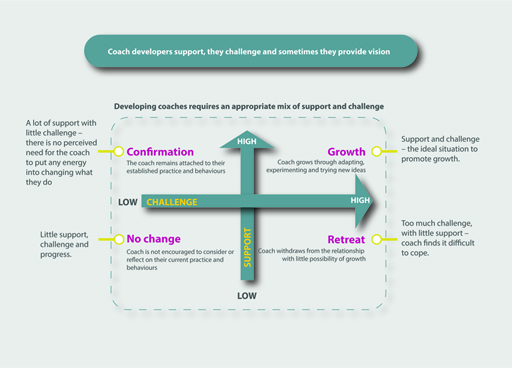8 Balancing challenge and support
Any effective person-centred learning and coach development is based on achieving the right balance between the support which is appropriate to the individual and challenge to progress the coach in their thinking or practice. This balance is represented in Figure 9.

It is likely that coaches will need different levels of support and challenge in different situations and contexts. Also, the balance may change over time. Recognising the support or challenge needed in a particular circumstance and being flexible in your approach is a key skill.
Activity 8 Challenge and support
Using the model above, think about supporting a coach. What coach developer behaviours in addition to those shown in the figure might be used to challenge and support a coach effectively?
An example is given below:
| Challenge-related behaviours | Support-related behaviours |
|---|---|
|
|
Discussion
Table 1 shows some examples of possible coach developer behaviours. Your response may well have differed depending on your working context. It is important to think about this balance between challenge and support throughout your work and to try and make it appropriate to each individual’s needs: not an easy task.
| Challenge-related behaviours | Support-related behaviours |
|---|---|
|
|
|
|
|
|
|
|
|
|
Becoming a better coach is a complex process and sometimes things may not go according to plan, this is when the support part of your role becomes crucial. In this final section you will find out more about learning from mistakes both as a coach developer and as a coach.
